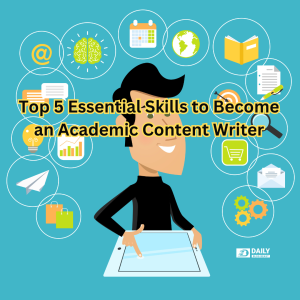Introduction:
College students and researchers rely heavily on specialized writing called academic writing. It can be found in any study or manual. It’s reasonable that many individuals have trouble with it, though, given how vital it is. There are a lot of rules to remember when writing academically.
Those skilled at it can earn a living by offering their services to others via freelance websites. However, academic paper writing skills are only necessary if you plan on working as a freelance writer. You never know when you might need to apply the skills you develop while writing for school.
Every academic writer, if they want to write better papers, needs to learn certain techniques. For academic writing to go well, authors must master these five abilities.
Top 5 Essential Skills to Become an Academic Content Writer:
1. The Art of Researching:
You should read widely about the topic you intend to write about before putting anything down on paper (or the keyboard, if that’s more your speed). Even if you already know much about the topic, it’s in your best interest to learn as much as possible before diving in.
Only with access to reliable resources can you hone your ability to conduct thorough research. Before the advent of the internet, I can only imagine how arduous it would have been to conduct scholarly research. Spending many hours in a library reading would be necessary. When doing research, search engines are invaluable, thanks to the internet. Many online resources, like JSTOR, offer extensive scholarly content. You may find academic resources all over the web with the help of Google Scholar, a subset of Google Search.
And while you’re at it, compile a list of the sources you consult most frequently so you may cite them in your final paper’s bibliography.
2. The Art of Planning:
Writing for academic audiences requires you to back up your claims with evidence from scholarly sources. However, the writer may become sidetracked if the research is too extensive. This is a typical problem among student writers who are just starting out.
A poorly organized academic paper will have points all over the place and will reflect poorly on the student. As a result, rather than enlightening the reader, the document just serves to further perplex them. Therefore, the ability to plan effectively is crucial in academic writing.
The first step in writing for any audience is organizing your academic articles effectively. Do you plan on describing an idea or an event in a descriptive paper? Do you intend to use this paper to make an argument? It’s also possible that your paper will center on convincing the reader to accept your stance.
It also helps to know who you’re talking to. Finding out who you’re communicating with might help you tailor your tone and content accordingly.
Once you’ve dealt with these, you’ll better understand how to structure your paper and present your arguments.
3. The Art of Formal Writing:
The boundaries between formal and casual writing are particularly blurry in academic writing. In every sort of academic writing, informal language is strictly forbidden. Word contractions, on the other hand, should be avoided at all costs. There are no negative words allowed. Substitute “do not,” “should not,” and “cannot” instead.
Common phrases and slang are also frowned upon in scholarly writing. Academic writing is not the place for puns, irony, and other figures of speech that many other writers may rely on for flair. Anything you put into an academic paper will be read exactly as it is written. Implied meanings are not allowed.
It takes a lot of practice for someone not used to writing in this fashion because of these dos and don’ts (remember that “don’t” does not belong in academic writing). They need to hone their abilities through repeated practice.
The capacity to choose appropriate language is another crucial talent for an academic writer. In academic writing, every word must be carefully chosen. Remember that you are likely writing for an academic audience and should use exact language. Word alternatives can be found with the help of dictionaries like Thesaurus.
4. Proper Formatting:
Here’s another skill that a writer for an academic paper needs to master. There are many ways to write a college paper. Some of these styles are APA, MLA, and Chicago. Each of these writing styles has rules that writers must follow exactly. If you break even one of these rules, even if it’s just by leaving out a comma, it’s a crime against the academic writing community and can hurt the credibility of your work. Yes, it’s that important.
For example, each writing style has a different way of citing sources in the text. They also write references and/or bibliographies in different ways. It wouldn’t be right to mix them up.
Because of this, you must follow the rules of each writing style. You can find templates for each of these writing styles on the internet.
5. Proofreading:
After you’ve done all your research, planned well, and followed all the rules of your writing style, the last thing you want is for one mistake to ruin all your hard work; even if it seems like a small mistake, that one mistake could hurt the trustworthiness of your work. Because of this, you should learn how to review.
Generally, you should wait a while before returning to the paper for a final review and rewriting. This way, you might see mistakes that you didn’t notice before. If you are writing on a computer, increasing the font size of your text is another way to find mistakes you might have missed. This makes your brain think you are reading a different piece, which makes it easier to find mistakes or things that don’t make sense in the paper.
Conclusion:
Becoming an adept academic content writer necessitates a multifaceted skill set. Proficiency in research methodology, critical thinking, and analytical prowess is indispensable. Mastery of citation styles, effective communication, and the ability to articulate complex ideas concisely are vital. Moreover, adaptability to various subject matters and adherence to academic integrity are paramount. Ultimately, honing these essential skills empowers writers to contribute meaningfully to scholarly discourse, fostering intellectual growth and advancing knowledge in their respective fields.


